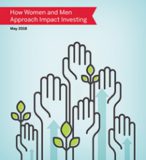A new report from the Women’s Philanthropy Institute examines how individuals use impact investing and whether women and men do so differently. The study finds that while both men and women embrace impact investing as a way to achieve social and financial returns, households where men make charitable giving decisions – either as single men, or as sole deciders within their marriages – are more likely to replace charitable giving with impact investing.
As impact investing continues to develop rapidly, the report – How Women And Men Approach Impact Investing – is among the first to look at gender differences in this relatively new field. The research, which is funded by a grant from the Bill & Melinda Gates Foundation, shows that key differences exist regarding how women and men approach impact investing in the context of their broader financial strategies. The findings raise important questions for nonprofits, wealth advisors, philanthropists and donors alike.
“The rise of impact investing demonstrates a growing enthusiasm for social change, but also raises concerns about the displacement of traditional charitable donations. By exploring how men and women approach impact investing, our findings can help nonprofits better navigate this new universe while also providing donors, wealth advisors and families the opportunity to evaluate where impact investing fits in with their broader wealth and philanthropic strategies,” said Debra J. Mesch, Ph.D., director of the Women’s Philanthropy Institute and the Eileen Lamb O’Gara Chair in Women’s Philanthropy at the Indiana University Lilly Family School of Philanthropy at IUPUI.
Key findings from How Women And Men Approach Impact Investing include:
- Women and men are equally likely to be aware of impact investing, but women are more likely to want to learn about impact investing.
- Impact investors are younger, have higher levels of education, and have higher incomes compared to people who don’t use impact investing. Women and men are equally likely to participate in impact investing, but gender differences appear for specific groups of people (separated by education or income level, for example).
- Households where men make charitable giving decisions – either as single men, or as sole deciders within their marriages – are more likely to replace charitable giving with impact investing.
- People who use impact investments in place of some or all of their charitable giving are associated with greater giving levels to religion, health, and animal causes.
How Women And Men Approach Impact Investing adheres to the broad definition of impact investing from The Global Impact Investing Network (GIIN): “investment made into companies, organizations, and funds with the intention to generate social and environmental impact alongside a financial return.” The report analyzes data from the Bank of America/U.S. Trust Study of High Net Worth Philanthropy series.




